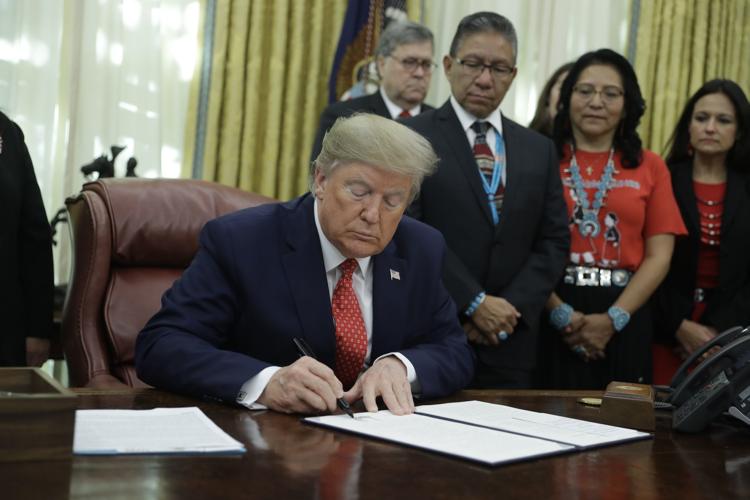President Donald Trump signed an executive order Tuesday establishing a federal task force to address a nationwide crisis of missing and murdered indigenous women.
During remarks in the Oval Office, Trump said the statistics involving missing and murdered Native women are sobering and heartbreaking. He said one study showed that Native American women in some tribal communities are 10 times more likely to be murdered than the average American.
“It’s a tremendous problem,” he said. “It’s been going on for a long time — many, many decades, beyond that. And we’re going to address it.”
The interagency task force will be co-chaired by U.S. Attorney General William Barr and Interior Secretary David Bernhardt. It will engage with tribal communities, develop protocols for new unsolved cases and establish a team to review cold cases.
“We will leverage every resource we have to bring safety to our tribal communities, and we will not waver in this mission,” Trump said. “We’re taking this very seriously.”
Indian Affairs visit
U.S. Rep. Dan Newhouse, a Republican from Sunnyside, welcomed the news and said U.S. Assistant Secretary of Indian Affairs Tara Sweeney will visit the region Dec. 16. She will participate in a summit on missing and murdered indigenous women hosted by Newhouse on the Yakama Nation reservation, according a news release from Newhouse’s office.
“The crisis of missing and murdered indigenous women affects tribes and Native communities across the United States, and the injustices they face are unacceptable. They need action now,” Newhouse said in a statement. “I am sincerely grateful to President Trump, Attorney General Barr and Secretary Bernhardt for listening to the concerns of the tribes and coming together to be a partner in tackling this problem.”
Washington is ranked second among states in number of cases related to missing and murdered indigenous women with 71 identified cases, according to Newhouse’s office. More than 34 Native women are missing or were murdered on or near the Yakama reservation, advocate Emily Washines has said.
Trump’s executive order follows Barr’s announcement last week of a nationwide initiative to address the crisis of missing and murdered indigenous persons. He said the Justice Department would invest $1.5 million to hire specialized coordinators in 11 U.S. attorney’s offices with significant caseloads from Indian Country. He visited the Flathead Reservation in Montana last week to share the news.
The executive order also calls for education and outreach campaigns for affected communities, a public awareness campaign in partnership with NamUs, a missing person database, and better use of existing criminal databases.
Effect on communities
Trump was joined by representatives of the Navajo Nation, which extends into New Mexico, Arizona and Utah; the Crow Nation in Montana; and the Mille Lacs Band of Ojibwe and the Fond du Lac Band of Lake Superior Chippewa in Minnesota.
Melanie Benjamin, chief executive of Mille Lacs Band of Ojibwe, said the problem needs to be solved.
“We cannot have this happening anymore,” she said. “It’s a historical day to know that our missing and murdered women have a place and a remembrance, and that we care about them and their families.”
Abigail Echo-Hawk, chief research officer of the Seattle Indian Health Board, who co-authored a report about missing and murdered indigenous women earlier this year, said the order is step in the right direction, though she hopes urban Indians also are included. A majority of American Indians and Alaska Natives live in cities.
The issue is nonpartisan “because it is simply about the safety of women,” she said in a written statement.
The Associated Press contributed to this article.







(0) comments
Comments are now closed on this article.
Comments can only be made on article within the first 3 days of publication.